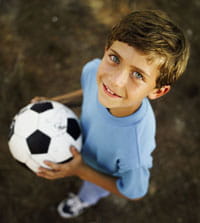What is a BBD?
 Bladder and bowel dysfunction (BBD) concerns problems with regular bowel movements and urination in children. Because the bladder and bowel share the same nerves, children with constipation often have bladder dysfunction.
Bladder and bowel dysfunction (BBD) concerns problems with regular bowel movements and urination in children. Because the bladder and bowel share the same nerves, children with constipation often have bladder dysfunction.
Concerns
BBD increases the risk for urinary tract infection (UTI). Also treatment of vesicoureteral reflux (VUR), the backflow of urine toward the kidneys, is more difficult to treat in a child with BBD. To help parents and children deal with BBD issues, the Division of Pediatric Urology of Children’s Hospital of Pittsburgh of UPMC established the Healthy Elimination Learning Program (HELP).
BBD symptoms
Problems with bowel function usually present as constipation, and bladder function problems usually present as daytime wetting, needing to urinate often and feeling the urge to run to the bathroom.
Treatment
Constipation can generally be treated with good nutrition, including increased fluid intake and increased fiber consumption. Children should have 2 servings of fruit, 2 servings of vegetables, and 2 to 4 servings of bread or dry cereal every day. Stool softeners or a laxative may be prescribed if the above are tried without success. For urinary dysfunction matters, “bladder training” encourages regular use of the bathroom at timed intervals. Also helpful is the avoidance of “the 5 Cs,” certain foods that are bladder irritants, such as caffeine, chocolate, citrus, carbonation, and food colorings.
Learn More About BBD









 Bladder and bowel dysfunction (BBD) concerns problems with regular bowel movements and urination in children. Because the bladder and bowel share the same nerves, children with constipation often have bladder dysfunction.
Bladder and bowel dysfunction (BBD) concerns problems with regular bowel movements and urination in children. Because the bladder and bowel share the same nerves, children with constipation often have bladder dysfunction.